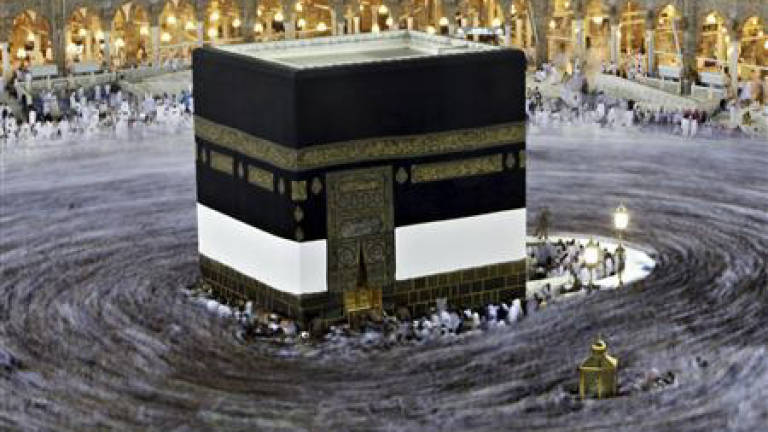Saudi Arabia ensures best services for guests of Allah

KUALA LUMPUR: Muslim pilgrims from all over the world would surely have noticed the frantic pace of development taking place over the past years in the holy city of Mecca while performing the haj and umrah.
Similar scenes could be seen at the Prophet's Mosque in Madinah which has witnessed a huge expansion.
This is testament to the seriousness of Saudi Arabia in taking its responsibility to ensure the interests of pilgrims are taken care of in the best possible manner every year.
Indeed, the kingdom, which is home to Islam's two holy sites of Mecca and Madinah, has ambitious plans to accommodate up to 30 million haj and umrah pilgrims in the coming years, according to its Vision 2030 introduced by Saudi Crown Prince Mohammed bin Salman.
What is certain is that the Saudis welcome pilgrims from countries all over the world, underscoring that no politics should be at play in discharging its heavy responsibility towards the Muslim ummah that currently numbers over 1.8 billion.
Saudi Arabia, which considers serving pilgrims as an Islamic duty, rejects any attempt to politicise haj or efforts towards the internationalisation of the Haramain (Mecca and Madinah) administration since it has managed to organise haj affairs in a peaceful, professional and perfect manner over the past decades.
"The government of the Custodian of the Two Holy Mosques King Salman bin Abdulaziz Al Saud has extended all efforts to serve haj and umrah pilgrims as part of its Islamic duty, and it will keep rendering such services for the sake of Allah's guests," a source at the Saudi Arabian Information Ministry said in response to queries from Bernama.
Vision 2030 includes a strategic and comprehensive plan to develop the sector to allow the largest number of Muslims possible to perform the haj and umrah. More than two million Muslims from all over the world converge on Saudi Arabia annually to perform the haj in a journey of faith.
For Malaysia, the Saudi Arabian government had given the green light for the Malaysian haj quota to be increased to 30,200 from 27,900, starting with the 2017 haj season.
Observers said this positive development stemmed from the close ties forged between Prime Minister Datuk Seri Najib Abdul Razak and His Majesty King Salman who made his maiden state visit to Malaysia last year.
Najib is also a frequent guest of the Saudi government – his last working visit there was in January during which he was given the rare privilege of entering the Kaabah which marks the direction that Muslims around the world face when praying.
For the Saudi government, there is no denying that developing haj and umrah organisations and services in the kingdom is among its top priorities, and an extension of the country's historic role in serving Muslims.
Combating terrorism and projecting moderate values of Islam – initiatives championed by Crown Prince Mohammed which have drawn positive response in Malaysia in particular and the international community at large in general – are other major endeavours by Saudi Arabia in the international arena.
Saudi Arabia's resolve to boost the haj and umrah sector partly stems from its recurring success in managing huge umrah crowds, allowing nearly 6.5 million pilgrims from across the globe to perform their religious duties.
The kingdom has embarked on what is touted as the largest expansion of the Mecca Grand Mosque so as to increase the capacity annually – something that is urgently needed.
Finding a solution to this issue is the focus of King Salman as he's making the largest expansion in the history of the holy mosque to accommodate more than 1.6 million worshippers in normal circumstances, as well as significant numbers of pilgrims during haj and umrah.
Besides strategic development of the holy sites' facilities and services, Vision 2030 also calls for the development of a world-class Haramain train network linking Mecca, Jeddah and Madinah as well as housing projects and tents for pilgrims.
In addition, it is eyeing the establishment of large modern airports to receive more guests, as well as completion targets of the expansion projects.
The Saudis are leaving no stone unturned when it comes to security of their haj and umrah guests as the vision calls for providing active security management to protect pilgrims.
The Saudi government views this as its fundamental duty and it has so far succeeded in organising peaceful haj seasons over the years.
"Saudi Arabia will spare no effort in bolstering its security, defending its stability and preserving interests of the pilgrims," the Saudi source said.
And it is understandably proud of the meticulous preparation and careful execution of planning that resulted in a zero-mistake 2017 haj period.
Besides security, the Saudis are also concerned with the wellbeing of haj and umrah pilgrims, and this is reflected in the vision itself.
The vision focuses on expanding health and medical services for pilgrims by preparing hospital and health centres to provide top-of-the-line services round-the-clock, in addition to sewage, cleanliness and lighting services at the holy sites and the Jamarat Bridge.
A scrutiny of the details contained in Vision 2030 will reveal a shift from seasonal work to a year-long work system and culture to enhance services and meet its objectives.
And King Salman is not taking things for granted as he has directed all relevant agencies to redouble their efforts and provide all facilities for the benefit of pilgrims.
According to the source, the king personally followed up on the available services and related developments.
Equally proactive is Crown Prince Mohammed who is keeping a close watch on efforts to better improve haj and umrah services with a view to providing smooth haj and umrah operations of the highest quality while ensuring security of pilgrims. — Bernama